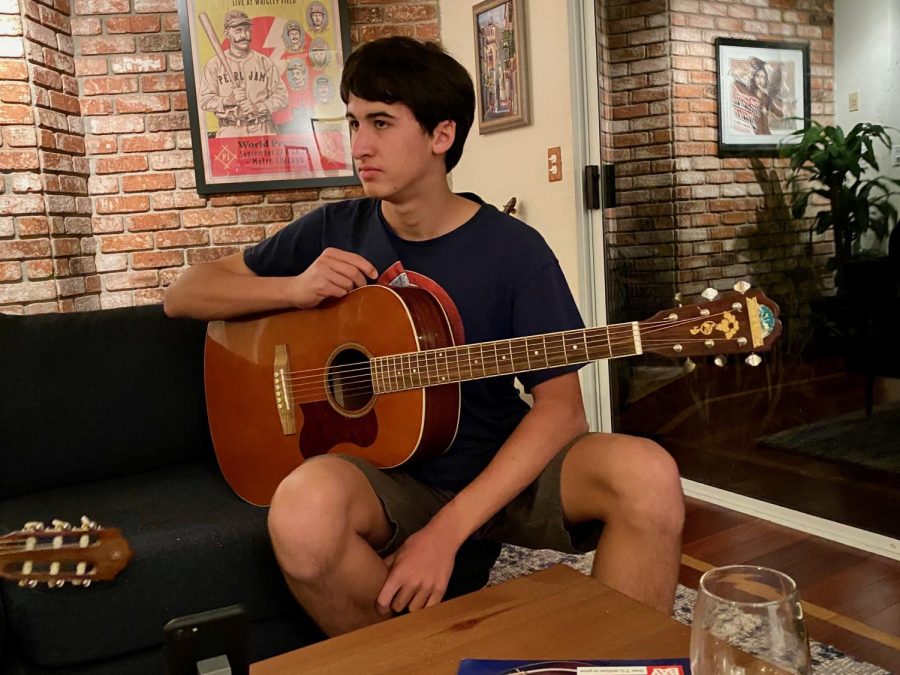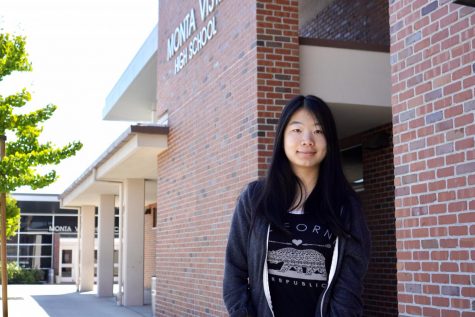Budding musicians
Students share about learning new musical instruments during quarantine
Photo Courtesy of Jacob Vrabel
Junior Jacob Vrabel began learning to play the guitar over the summer with help from his parents, as his dad has played guitar for 15 years, and his mom has played since she was young.
September 25, 2020
“That thing is evil,” junior Jacob Vrabel said.
Vrabel, who began learning guitar during the summer due to the lack of outdoor activities because of the COVID-19 pandemic, finds the B chord especially difficult: it’s a bar chord that requires holding down all the strings with an index finger and it’s hard to reach the hand position on different strings with the other fingers. Despite the difficulties with the B chord, Vrabel has always enjoyed music that includes guitars, especially classical rock, and appreciates that he could learn a new skill that he didn’t have time for before.
Vrabel believed his prior music experience — piano lessons in elementary school and baritone and trumpet classes in middle school band — aided him in learning guitar, as he already knew the sound of a properly played note and how to keep the rhythm.
“The rhythm keeping was the most helpful part, since guitars are so different from most other instruments,” Vrabel said. “You have to play chords instead of notes. But being able to know when I had to play something was definitely helpful going into it.”
Similarly, junior Avi Das learned piano in third grade, but stopped as he lost motivation and became busier with school. However, during quarantine, he listened to piano covers of songs from his favorite shows and wanted to give it a try again.
“I definitely appreciate [music] more now and I feel like the way I came to realizing that was by becoming more mature,” Das said. “I understand the beauty of the music that’s created.”
Das used online resources to relearn the basics, but now he primarily teaches himself. He practices the old piano materials he has or new sheet music he prints from the internet. However, he also finds that learning during quarantine can be frustrating, as it’s difficult to reach out to a professor or music teacher for help.
According to interim instrumental music teacher Fleurette Sevin, the biggest drawback of self-learning an instrument is not knowing that you’re doing something wrong and picking up bad habits. Sevin grew up in a very musical family, where her father woke her and her siblings on Sunday mornings with organ music or recordings of music and quizzed them on composers. As a result, she has played a number of instruments including the piano, clarinet, oboe and French horn. She’s also self-learned a number of instruments like the trumpet, saxophone and flute, drawing from musical similarities to other instruments.
“I would encourage a self learner to check in with someone who knows how to play,” Sevin said. “For example, on flute, I play with the wrong fingerings because I play with oboe fingerings. And some of the notes are a little out of tune because I’m not playing with completely correct fingerings. And I have to remind myself, ‘Oh yeah, flute players, they leave that finger down.’”
Vrabel has had help from his parents in getting started with guitar, as they have both played the instrument for a while now — his dad for about fifteen years, and his mom since she was young. However, he appreciates not having formal lessons, as he feels that learning on his own is more fun.
“Mostly because you have a little bit more control over what you’re doing,” Vrabel said. “When you have to learn it from a lesson, [the teachers] tell you what to play and how to play it. Having restrictions on what music you’re playing always seemed kind of contradictory to me.”
Vrabel has learned “Better Man” by Pearl Jam, “Southern Cross” by Crosby, Stills & Nash and “Darkness on the Edge of Town” by Bruce Springsteen, with the latter being his favorite. These are songs that his parents listened to as he was growing up, leading him to enjoy older music.
Das has learned pieces from Beethoven as well as songs from anime — wanting to play “Watashi no Uso,” a song from “Your Lie in April,” especially motivated him to learn piano. However, his favorite song to play is from “Secret Base,” an anime that he said was extremely sad but he loved the soundtrack.
“[My favorite part of learning piano is] definitely being able to play all the songs I really enjoy listening to, from all the different types of genres,” Das said. “I guess the best part is to play for other people, and then you all appreciate the music together.”
Sevin also highlights one of the benefits of music to be the social element, as she considers playing music with her family a chance to connect with them. She says another benefit is that it can function as an emotional release: horns can play high, brassy notes, and she can use it to express her emotions as a way of screaming through the instrument.
“If you’re at all interested in music or picking up an instrument, I would encourage people to get started,” Sevin said. “If you’re a senior, and you think, ‘Oh, it’s too late,’ you’re not. Or even after you graduate from high school, it’s not … It’s never too late to start an instrument.”

















